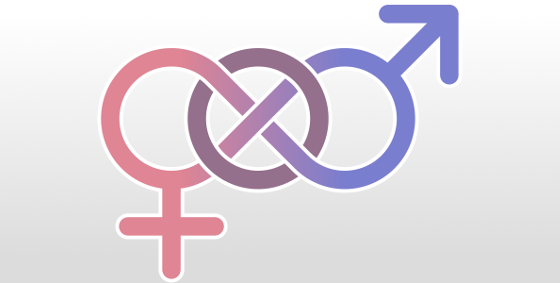Dear Scott: Why Does Gender Identity Matter?

Dear Scott: A friend of mine has informed me that they consider themselves “genderfluid.” They dress as a boy, act like a boy, but she’s a woman. Sometimes she’ll even wear a dress. It’s pretty confusing, since I’ve known her for a year. Even though she gave me an explanation, I am still a bit confused as to what “genderfluid” is and why it even matters that they call themselves this. So why is gender “identity” even important and what do I do about her? From Confused in Colorado.
Dear Confused:
Well, let’s start this conversation by first defining a few of the terms you are having trouble with. Your friend is considered “non-binary,” which is an umbrella term that covers a whole spectrum of gender identities underneath it, but a basic definition is pretty much someone who does not identify as either male or female. To go further, non-binary individuals may identify as “bigender” (identifying as both male and female), “agender” (no gender identification), “genderqueer” (not sure what they identify as), or even “genderfluid” (a mix between the two), but the list does not stop at these four. At first, this can be a bit confusing to grasp. Just sit with that feeling. Your friend may feel that they identify more as a female one day, more as a male another day, or more of an actual mix of both. Now, gender is not the same as sex. Sex refers to the genitalia one has at birth. Gender refers to an individual’s feeling or internal sense of what they are (man, woman, a mix of the two, neither, etc.). A person who is female assigned at birth may grow up feeling that they are in the wrong body, that they should be in a male body. And that’s okay. It’s actually more common than most of us wish to acknowledge and there’s nothing wrong with it. Your friend more than likely feels that they are a mix of a male and a female. It’s hard to quite wrap one’s head around if you do not personally experience it but it’s really not up to you to “do anything” about it. What you can do is be aware of your friend’s preferred pronouns, as they can change from day to day, or even within the day. In the end, it’s really up to your friend to decide what they are, regardless of how you knew them as previously. Just remember that there is really no intrinsic link between sex and gender, anatomically speaking.
Gender identity, and acknowledging it, is important for numerous reasons: it validates an entire group of marginalized people, it provides proper identification for confusing feelings, it is empowering to know what one is, and may also provide a frank and open discussion about representation in both media and everyday life. Your friend’s identity is very important to them and it is just as important that you acknowledge and respect it, just as you would expect them to do with you. You wouldn’t enjoy it if someone continually denied or questioned that you were what you felt.
In summary, there’s nothing “to do” about your friend’s gender identity. In this specific case, if you’re unsure as to what they identify as at any point, I would assume it’s appropriate to ask, politely. Since they decided they were comfortable enough with you to tell you that they consider themselves genderfluid, they may also be comfortable enough to let you know what they identify as at any given point. You’re taking a great step forward in your attempts to understand both what your friend’s gender identity is and why it matters to them and in general. Respect and understanding are some of the greater things you can do for your friend, and it seems like you’re already on your way to doing just that.
Dear Scott: Why is it important for someone/society outside of your personal relationships to understand how you identify (in regards to gender)? Sure, I understand there are huge d-bags out there who really hate queers- but I don’t think they are as prevalent as people try to make them seem. From Curious Pixii.
Dear Pixii:
What an excellent question! The simple answer for why it is important for society/people to understand how a person identifies lies in representation, normalization, and general acceptance of a person’s identity. The problem actually does lie in the “huge d-bags out there who really hate queers;” as their views are usually reinforced by the way society views or treats the individuals who are the subjects of this irrational hatred. As hatred and fear are not natural reactions to your fellow human beings, this subsequently leads us to acknowledge that these views are propagated by family, society, media, news outlets, peers, and even personal experiences.
Because of this, people who identify differently from what is typically viewed as “normal” (which isn’t actually as normal as we may believe) face a much larger occurrence of harassment, both in the streets and in personal relationships, and despite being recognized in major psychology as completely legitimate, identifying outside the “gender binary” (being either male or female) is still not recognized in public policy within developed nations. Imagine you felt some major confusion as to whether or not you felt you were male or female. Now imagine you felt that you didn’t quite fall into this binary system, but you had no other form of representation, legally or socially. Now also imagine that you have your identity and gender questioned almost every time you went out in public in whatever clothing you felt was appropriate for you. It would probably make you feel very uncomfortable and as if society (and the people who make up that society) didn’t accept who you were, no matter what you had to say about it.
Unfortunately, it is the “huge d-bags” of our society, who feel strongly that certain gender identities don’t, or shouldn’t, exist, that are making the most noise about this issue. They are the people who protest transgender individuals going into their properly gendered bathrooms, who assault transgender and non-binary individuals, and who virulently attempt to delegitimize and slander members and allies of the trans- community. Even more unfortunate is the fact that these people’s views are reinforced by the lack of acknowledgement in the general public toward the legitimacy of the different genders and identities. Without an understanding of how someone identifies, anyone that identifies outside of the gender binary is forced to live in a society that does not recognize them as legitimate people. Without an understanding of gender and identity, public policy will not move progress to include these marginalized individuals; there will be little to no political or social recognition for these people.
Consider this: people like to identify with labels because it makes it easier to find terminology to explain what they are experiencing. It opens them up to a world where they are not the only ones who feel this way. It’s not really a way to be special, it’s a way to understand and belong.
Ultimately, it is important to make these individuals feel safe in society as a whole, to help them to realize that it is okay to be who they are, and to have this reflected in our media, our laws, and our treatment of these people both publicly and privately. They are people and want to treated as such in all parts of society.

Scott Bright is a second-year ACC student, a Psychology major (with an emphasis on Human Sexuality), as well as the former Editor-in-Chief for The Arapahoe Pinnacle. Still contributing as the Pinnacle's advice columnist, he lives,...





Carly Fabian • Sep 21, 2016 at 10:26 pm
Great thoughts, Scott. Coming from someone seeking a certificate in gender studies, you seem to have a great understanding of the identifications as well as a deliberative voice.
Scott Bright • Sep 21, 2016 at 11:00 pm
Thank you, Carly! Coming from someone I look up to and admire as much as you, this is a huge compliment. Coincidentally, I’m also seeking a certificate in gender studies! It’s completely validating and reassuring hearing from someone within the community that I am doing good things.